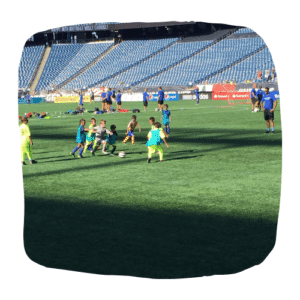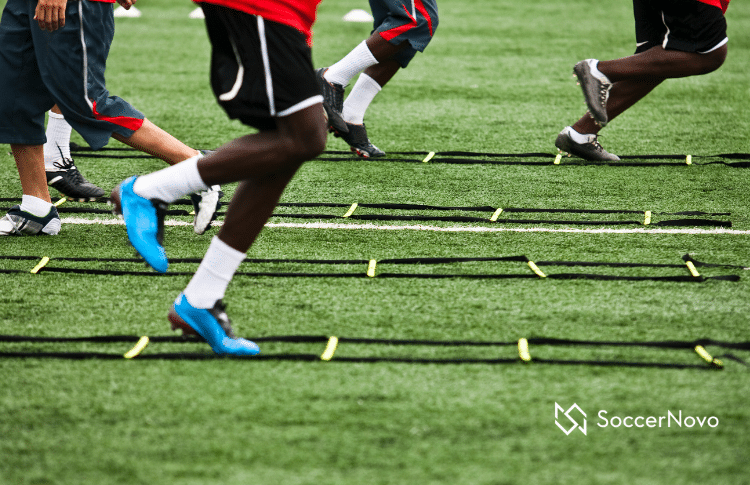Should My Child Play Competitive Soccer?

Are you considering putting your child into a more competitive soccer program? It can be quite an important decision and one that requires more thought than just clicking “register now”.
While playing soccer can be a fun and rewarding experience for kids, competing at a high level can come with its own set of challenges.
 One of the biggest factors to consider is whether your child is truly passionate about soccer. This is absolutely the most important thing to consider.
One of the biggest factors to consider is whether your child is truly passionate about soccer. This is absolutely the most important thing to consider.
If they don’t have a genuine interest in the sport, pushing them to compete at a high level can lead to burnout and resentment.
If your child loves soccer and is eager to improve their skills, playing on a competitive team can provide valuable opportunities for growth and development.
It’s important to weigh the benefits and drawbacks of competitive soccer against your child’s individual needs and goals.
In this article, I provide my personal perspective on the topic as my son has been playing competitive soccer since he was six. He’s now 13 and ready to go off to high school 🙁
Don’t Take it Too Seriously [Don’t Skip This Part]
Before we get into the guts of the article, I just wanted to provide some perspective about starting competitive or club soccer.
I think the most vital thing parents can do is not take it too seriously. This took me some time to learn and I do regret taking it too seriously early on. Honestly, this will only add unnecessary pressure on you and your child.
Don’t think this is a gateway to a pro contract. Don’t think they need to be the best on their team. Don’t think they need to play great every game. Don’t look down on rec soccer.
Let them be the best version of themselves. Trust the process. Let them be a kid in a sport they love playing.
As a soccer parent, the best thing you can do is instill in them a love for the game, a good work ethic, and a passion to come back next year. It’s pretty much that simple in my opinion.
Physical and Mental Benefits of Playing Competitive Soccer
Physical Benefits
Soccer is a high-intensity sport that requires a lot of running, jumping, and quick movements.
This can help improve your child’s cardiovascular health, endurance, and overall fitness level.
Additionally, soccer can help develop your child’s coordination and balance, as well as improve their speed, agility, and strength.
Here are some of the physical benefits your child can gain from playing competitive soccer:
- Improved cardiovascular health
- Increased endurance
- Improved coordination and balance
- Increased speed, agility, and strength
All of this can build a healthy foundation for soccer and other sports like basketball, football, softball, baseball, and lacrosse.
Mental Benefits
 Playing competitive soccer can also have positive effects on your child’s mental health and well-being.
Playing competitive soccer can also have positive effects on your child’s mental health and well-being.
Soccer requires a lot of focus, concentration, and quick decision-making, which can help improve your child’s cognitive abilities.
Additionally, playing on a team can help your child develop important social skills, such as communication, teamwork, and leadership.
Here are some of the mental benefits your child can gain from playing competitive soccer:
- Improved cognitive abilities
- Development of important social skills
- Increased self-confidence and self-esteem
- Improved ability to handle pressure and stress
Risks of Playing Competitive Soccer
Injuries
Like with any sport, playing competitive soccer comes with a risk of injury.
Common soccer injuries include sprains, strains, and fractures. These injuries can occur from collisions with other players, falls, or overuse. Injuries can range from minor to severe, and can lead to missed playing time and medical expenses.
While some injuries are unavoidable, there are steps you can take to reduce the risk of injury.
Make sure your child is properly warmed up before playing and wears appropriate protective gear, such as shin guards.
Encourage your child to stay hydrated and take breaks when needed.
Also, use off-days as fun days with the family. Do something other than soccer!
Burnout
Burnout often occurs when a child becomes overwhelmed or loses interest in the sport.
This can happen when a child is pushed too hard or when the focus on winning becomes too intense. Burnout can lead to decreased motivation, decreased performance, and even quitting the sport altogether.
At a young age, creating a fun soccer experience should be the number one priority for coaches.
Also, as a parent, encourage your child to take breaks and pursue other interests.
Additionally, make sure your child is playing soccer for the right reasons – because they enjoy it and want to improve – rather than because of external pressures (such as trying to make you proud).
They need to want to do it for themselves.
Is Your Child Ready for Competitive Soccer?
Before registering your child for a club soccer team, it is important to assess their readiness for the sport. Here are a few factors to consider:
Physical Ability
Playing competitive soccer requires a certain level of physical ability.
Your child should have decent coordination, balance, and endurance. They should also be able to run for extended periods of time without getting winded.
If your child struggles with any of these physical abilities, you have two choices:
- Wait until next season to get in better soccer shape.
- Sign them up now and let the season train them. I would opt for this option.
Mental Preparedness
Soccer can be mentally challenging for children. They may experience pressure to perform well, deal with losing games, and face criticism from coaches and teammates.
In our case, my son needed a competitive soccer program to get mentally stronger. I was his coach for the previous three years so he needed someone else to tell him what to do.
Talk to your child about the expectations of playing competitive soccer and make sure they are ready to commit to the sport.
Time Commitment
When you sign up for club soccer, gone are the fall days of Saturday morning games and one practice during the week.
Club soccer typically requires more time for training and games that can last almost all year.
In addition to the normal practice and game schedule, there may be tournaments and extra training involved.
Make sure you and your child are willing to commit to the time requirements of competitive soccer before signing them up.
Skill Level
Your child should have a basic understanding of soccer and be able to perform the fundamental skills of the sport before playing competitively.
If your child is new to soccer, it may be best to start with recreational leagues to build their skills and confidence.
Club soccer is a stepping stone from rec then travel. It’s a natural progression in a child’s soccer development in the U.S. But, it’s always advantageous to start with the basics no matter how athletically gifted a child is.
Should They Play Other Sports?
Yes!
At a young age, playing multiple sports can have numerous benefits, including:
- Developing a wider range of physical skills: Playing different sports can help your child develop a wider range of physical skills, such as hand-eye coordination, balance, and agility.
- Reducing the risk of injury: Focusing on one sport can increase the risk of overuse injuries. Playing multiple sports can help prevent these injuries by allowing your child to use different muscles and movements.
- Building a more well-rounded athlete: Playing multiple sports can help your child become a more well-rounded athlete, with a better understanding of different game strategies and tactics.
- Avoiding burnout: Focusing solely on one sport can lead to burnout and a lack of enjoyment. Playing multiple sports can help keep your child engaged and excited about sports.
- Find Something They Love More: They may fall in love with another sport (and that’s okay). By bucketing them into soccer only, you’re limiting their ability to try new things.
Of course, it’s important to find a balance between playing multiple sports and ensuring your child doesn’t become overcommitted or overwhelmed.
Work with your child about their interests and goals, and work with them to develop a schedule that allows them to participate in multiple sports without sacrificing their academic or social commitments.
For us, my son did basketball every winter. He also played flag football for three years during the fall. There were a few occasions when we would have to prioritize one game over another but we made it work. They were some great memories!
Finding the Right Competitive Soccer Program
It is important to find the right club soccer program in your area. I wrote an article ‘How to Find the Best Youth Soccer Club For Your Child’ that is helpful. Instead of rewriting it, check out the article for some helpful tips and recommendations.
Financial Commitment
When it comes to competitive soccer, there is no denying that it can be a significant financial commitment.
Between equipment, registration fees, travel costs, and other expenses, the costs can add up quickly. Before deciding if competitive soccer is right for your child, it’s important to consider the financial implications.
For example, in 2022, we spent over $7,500 on soccer for my son who was twelve at the time.
When first starting out, the club registration fees will most likely be less but you’ll still be looking at over $2,000 to play. When you break it out over the course of the year, it’s not bad with the higher-level coaching and game schedules you get.
Balancing School, Soccer, and Other Activities
Playing soccer at a competitive level requires a significant time commitment. In some cases, this can impact your child’s ability to keep up with schoolwork and participate in other activities.
One way to balance school and soccer is to create a schedule that allows for both.
This may mean setting aside specific times for homework and studying, and making sure that soccer practices and games don’t interfere with important school deadlines.
Another way to balance school and soccer is to make sure that your child is getting enough rest.
As I stated above, playing soccer can be physically and mentally demanding, so it’s important to ensure that your child is getting enough sleep and taking breaks when needed.
This can help prevent burnout and ensure that your child is able to perform well both on the field and in the classroom.
Also, by limiting the amount of screen time you allow your child, the more productive time they will get back in their day. This can also keep the mind sharper if they replace it with proper rest.
If your child is struggling with schoolwork or needs to miss soccer practice for an important school event, it’s important to communicate this to both the coach and the teacher. This can help ensure that everyone is working together to support your child’s success both on and off the field.
Conclusion
In summary, deciding whether or not your child should play competitive soccer is a family decision that should be based on a variety of factors.
It is important to consider your child’s interests, abilities, and goals, as well as the potential risks and benefits of playing competitive soccer.
If your child is passionate about soccer and has the skills and drive to compete at a high level, then playing competitive soccer may be a great opportunity for them to develop their skills, make new friends, and achieve their goals. If you also have the financial means, then I say GO FOR IT!
Ultimately, the decision to play competitive soccer should be based on what is best for your child and your family’s priorities.
By considering all of the factors involved and making an informed decision, you can help your child have a positive and rewarding experience playing competitive soccer for years to come.

Written By: SoccerNovo
SoccerNovo is an independent youth soccer media brand built to help parents, players, and coaches better understand the game and the pathways available in U.S. soccer. Our mission is to make youth soccer simpler, clearer, and more accessible for everyone involved in it.
Let’s connect






